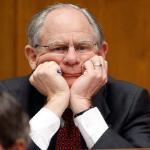2010 Voters: Anti-Moderate Not Anti-Incumbent
 Pundits claim we're witnessing a wave of anti-incumbent anger directed against all Washington. In truth, the anger has only been aimed at both parties' moderates.
Pundits claim we're witnessing a wave of anti-incumbent anger directed against all Washington. In truth, the anger has only been aimed at both parties' moderates.
In their quest to impose a narrative onto the primary season, pundits and newscasters have latched onto the idea that we're witnessing a wave of anti-incumbent anger directed against all of Congress. This is simply not backed up by any evidence: while it is true that, in contested races, anti-establishment candidates have tended to prevail, most races have not been contested at all. Over four hundred and fifty Congressmen and Senators up for re-election have either been re-nominated or have witnessed their establishment successor win the nomination.
Republican or Democrat, win or lose, however, the party-favored nominees who have faced legitimate challenges have invariably been more moderate than those they were opposed by. The left presented Blanche Lincoln and Michael Bennet with serious opponents, while Arlen Specter was successfully toppled. Thanks to the Tea Party, the right's challenges have been more fruitful, knocking off Bob Bennett and Lisa Murkowski, denying nominations to Mike Castle and Charlie Crist, and giving John McCain a scare. None of these people's challenges have had anything to do with ethical reasons, or because they were unpopular with the state at large: they were all punished for not adhering to ideological orthodoxy.
A new Public Policy Polling survey shows that two-thirds of Republican primary voters want to ditch Olympia Snowe in 2012 for a more conservative candidate. In an environment like this, what can Snowe, popular amongst Maine voters as a whole, do? If she switches parties, she may well face the same fate Arlen Specter did. Ben Nelson, also up for re-election in 2012, faces similar questions.
Is there any room for moderates in national politics? One may point to the Blue Dogs, but they comprise an astonishingly high proportion of the Democrats likely to lose their House seats this November. We are witnessing an incredible polarization of the parties. But politicians like Ben Nelson, Mike Castle, and Olympia Snowe -- with American Conservative Union ratings of roughly 50 -- have to go somewhere. There is no obvious party for such people; it comes down to a matter of priorities. Are today's political activists ready to deny all of them seats at the table?
At the bottom of things, the problem may rest with the closed-primary system. Americans are not nearly as polarized as the parties are. New Hampshire's open system may be worth emulating: Republicans vote in their primary, Democrats vote in theirs -- but independents may select either ballot. If Delaware had such a system, the state could never have produced a Christine O'Donnell. It will weaken the power of state parties, of course, which is why such policies aren't as common as they should be. But the results it produces are undeniably sane.